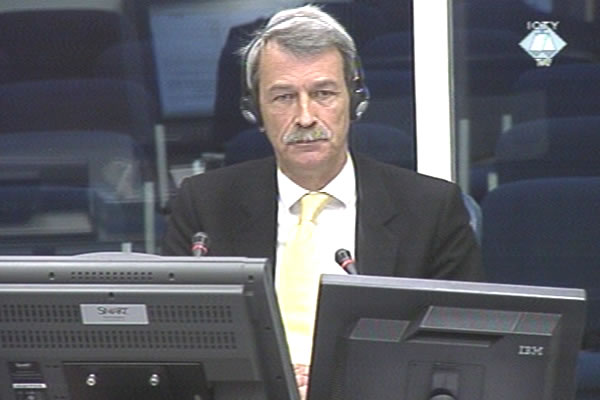Home
DID SREBRENICA POPULATION HAVE A CHOICE?
According to the former deputy commander of the Dutch Battalion Robert Franken, Mladic’s defense case that the civilian population in Srebrenica could have remained in the enclave in July 1995 if they had wanted to was ‘pure nonsense’. The choice to stay was theoretical; in practice the things looked quite different, Franken explained
 Robert Franken, witness at the Ratko Mladic trial
Robert Franken, witness at the Ratko Mladic trial The trial of Ratko Mladic, former commander of the VRS Main Staff, continued with the evidence of Lieutenant Colonel Robert Franken. In the summer of 1995, Franken served as the deputy commander of the UN Dutch Battalion in Srebrenica. Franken has testified at all the Srebrenica trials at the Tribunal. At Mladic’s trial, Franken’s written statement based on his previous evidence in the Popovic, Tolimir and Karadzic cases was admitted into evidence.
In his previous testimony, Franken termed the claim that the civilians could have stayed in Srebrenica in July 1995 if they had wanted to ‘pure nonsense’. At Mladic’s trial, Franken explained that the choice was there only theoretically. In practice, things were rather different: it was very hot, the sanitary conditions were bad, and the population had no food or medical aid. They had nothing. ‘If you call that a choice, then they had it’, the witness said.
The prosecutor corroborated Franken’s opinion that the Srebrenica population had no real possibility to remain in the enclave with a VRS document from July 1995. The document quoted Mladic as saying they would evacuate all ‘those who want to and those who don’t want to’ be evacuated.
Franken explained why he signed a document stating that the evacuation of the population from Srebrenica had been carried out in line with international law on 17 July 1995. Colonel Jankovic made it clear to Franken that his signature would ‘have a positive impact’ on the evacuation of 59 wounded men from Srebrenica. In order to counter the contents of the document, Franken wrote by hand that the evacuation had been done properly ‘in those cases when the UN forces were able to escort the convoys’. The only convoy the UN troops were allowed to escort was the first one to leave Srebrenica.
Franken made a list of 250 men that had been separated from the women and children in Potocari by the Serb forces. Franken told Colonel Jankovic about the development and warned him that the wounded were being mistreated. Colonel Jankovic didn’t respond. In the afternoon of 13 July 1995, Jankovic told Franken that the BH Army ‘had broken out’ of the encirclement and that the VRS had about 6,000 captives. Franken’s soldiers told him that they saw a large number of captured Muslims en route from Bratunac to Potocari. They were seen kneeling with their hands on the back of their heads in a football stadium.
Yet again, as with previous UN witnesses, Mladic’s defense argued that Srebrenica had not been completely demilitarized. Defense counsel Miodrag Stojanovic put it to the witness that the UN had sided with the enemy and had thus become a warring faction. According to the defense, this was based on the ‘green order’ the Dutch Battalion received instructing it to defend the enclave with all available assets. Franken agreed that the UN failed to complete the task and did not demilitarize Srebrenica completely. However, Franken denied that the UN had sided with the BH Army. The defense will complete the cross-examination of Robert Franken tomorrow morning.
